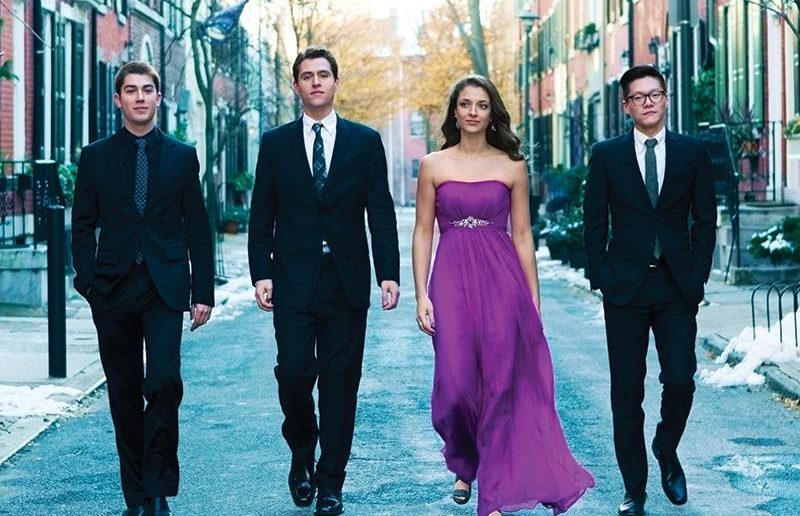Dover Quartet makes a refined and intense Miami debut

The Dover Quartet performed Tuesday night at Coral Gables Congregational Church. Photo: Lisa Marie Mazzucco
The Dover Quartet made its Miami debut Tuesday night at Coral Gables Congregational Church in a generous program for Friends of Chamber Music. With violinist Joel Link providing strong leadership, the group is distinguished by its refined corporate blend and strong interpretive instincts. This exceptional young ensemble was joined by the excellent clarinetist Alexander Fiterstein for Mozart’s Clarinet Quintet.
Haydn’s Quartet in F minor, Op. 20, no. 5 is one of Haydn’s sturm und drang works, dark and tempestuous in expression. The Dover players probed deeply into the dramatic and emotional subtext of the initial Moderato. They managed to capture both the stormy mood of the Menuet while injecting wit in Haydn’s quirky curves of phrase. The simple grace of the principal melody of the Adagio displayed the group’s plush tone and ensemble unanimity. Often the four players sounded as one. The crisp rhythm of the fugal finale brought the music’s tension to the fore in a remarkably angry conclusion to a middle period work by the “father of the string quartet.”
Borodin’s String Quartet No. 2 in D Major is a repertoire staple but the Dover avoided the sugary, vibrato-laden sound that many Russian quartets bring to this work. Camden Shaw’s mahogany cello sound was finely matched to Borodin’s colorful themes in the first movement. Violist Milena Pajaro-van de Stadt, who studied with the Amernet Quartet’s Michael Klotz, produced a large tone that blended well with Shaw’s sonority. The players brought incisive articulation to the skittering Scherzo. After giving lush expansiveness to the secondary theme, the players made a rapid leap to the movement’s conclusion.
The spaciously shaped melody of the Nocturne contrasted with the players’ robust attack in the central section, evidencing fine differentiation of mood. After the Beethoven-like mystery of the finale’s opening measures, the quartet took off at top speed in the final Vivace. A standing ovation greeted the players following this exceptional performance.
The program’s post-intermission half commenced with John Corigliano’s Snapshot: Circa 1909 in honor of the American composer’s 80th birthday (which occurred on February 16). Pizzicatos precede the second violin intoning a lustrous Mahlerian melody that could well have been written in 1909. Bryan Lee’s strong tone and Link’s counter-figures were accompanied by plucked lower strings.
Fiterstein is a superb musician. In the Mozart quintet, his mellow sound and agility in the leaping lines between the instrument’s registers was balanced by astute blending with the strings. He spun the main theme of the Larghetto in one long arc, giving breadth to late Mozart at his most sublime. The Menuetto emerged relaxed and utterly natural in pulse.
The concluding set of variations is one of Mozart’s most charming confections. Fiterstein’s pure tone was matched by the quartet’s spirited playing, with the coda thrown off at top speed.
For an encore, Fiterstein and the Dover turned on a dime into a klezmer band for a piece from the repertoire of clarinetist David Krakauer. Fiterstein played with idiomatic flair and mastery of the clarinet’s rapid runs and breezy dance tunes.
Friends of Chamber Music’s season continues with Rafal Blechacz playing works by Mozart, Beethoven, Chopin and Schumann 8 p.m. April 17 at Coral Gables Congregational Church. miamichambermusic.org
Posted in Performances
Leave a Comment
Wed Mar 21, 2018
at 1:04 pm
No Comments






